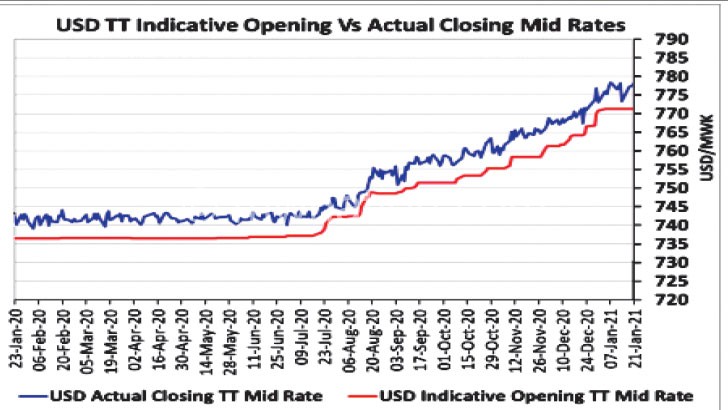Kwacha still Under pressure
The kwacha, which has lost substantial ground in the past seven months against major trading currencies, continues to depreciate further against major trading currencies due to increased demand for foreign exchange, analysts have said.
The kwacha ended the year 2020 at its lowest, shedding 4.33 percent against the dollar to K770 due to the decline in foreign exchange supply which exerted pressure on the country’s foreign exchange reserves.
Last Friday, the Reserve Bank of Malawi (RBM) foreign exchange market report indicated that the kwacha further depreciated to K777.76 during the week from K773.36 in the prior week, a development a financial market dealer has linked to the continued demand for foreign exchange in the lean season on the back of importation bills on agricultural inputs and Covid-19 management supplies.

In an interview on Saturday, Financial Market Dealers Association president Mclewen Sikwese projected that in the short-term, there would be sustained supply and demand imbalances, which will continue to exert pressure on the local unit.
He said the impact of Covid-19 on foreign exchange supply will, among others, be key on the performance of the kwacha in the short to medium-term.
Said Sikwese: “How the pandemic will affect the operations of foreign investors, international organisations and the tobacco selling season, which together are the biggest sources of foreign exchange will determine the stability of the kwacha.
“Postponement or slowdown of their operations due to Covid-19 will significantly depress supplies and lead to more pressure on the kwacha.”
He said going forward, the central government’s appetite for foreign exchange intensive programmes such as the K160.1 billion Affordable Inputs Programme and its ability to be flexible in light of changing foreign exchange supply situation, will also heavily impact the prospects for the kwacha’s stability.
The kwacha has been depreciating rapidly since the third quarter of 2020, a development analysts said was inevitable to release the pressure which had been building up from the tail end of 2018, culminating in the depreciation of the kwacha mid-2019.
During the lean season, there is less foreign exchange coming into the market and at the same time, there is high demand for foreign exchange as farm inputs such as fertiliser are imported.
RBM figures show that gross official reserves as at December 2020, stood at $952.23 million (about K733 billion), an equivalent of 4.56 months of import cover, a decrease from $1.17 billion (K901 billion), an equivalent of 5.60 months of import cover registered at the end of December 2019.
The Economist Intelligence Unit has projected that the rate of depreciation will be moderated this year by increasing foreign investment inflows and earnings from the agricultural sector.





